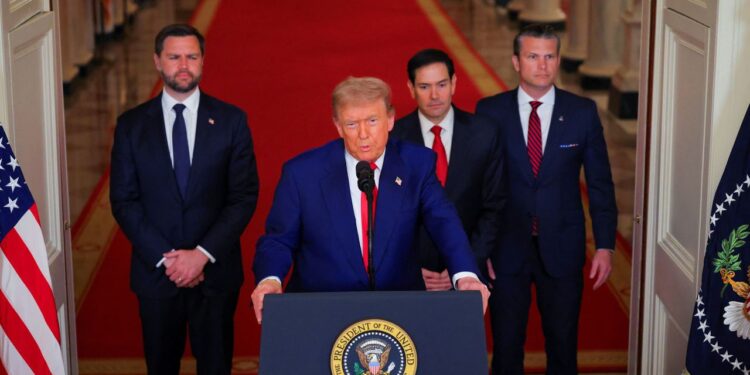In a resounding announcement, US President Donald Trump confirmed on the night of Saturday to Sunday that the United States armed forces had led “very successful” air strikes against several Iranian nuclear installations, including Fordow, Natanz and Ispahan sites. These infrastructures are among the most strategic of the Iranian nuclear program. According to Trump, they were “completely and completely destroyed”, although no evidence was provided in support of these claims.
In a solemn speech from the White House, the American president warned Iran that in the event of response, other targets were “ready to be struck”. On social networks, he insisted: “Do not forget, there are still many targets. »»
Tehran denounces a “scandalous” attack
The Iranian reaction was not long in coming. The Minister of Foreign Affairs described these strikes as “outrageous” and warned that they would have “lasting consequences”. The Iranian Atomic Energy Organization has sworn not to “never” give up its nuclear program, calling on the international community to condemn American intervention.
In a context of exacerbated tensions, a high adviser to the Iranian supreme guide spoke of the possibility of strikes against American ships in the Gulf and the closure of the Strait of Ormuz, the nerveless point of world oil trade. The supreme guide, Ayatollah Ali Khamenei, has not yet expressed himself publicly.
Regional climbing: Israel and Iran on the front line
The American strikes occur while the conflict between Israel and Iran has taken a dramatic turning point since June 13. Iran says more than 400 people have been killed and more than 3,000 injured since the start of the Israeli offensive. In response, Iranian missiles targeted the center and northern Israel, killing at least 23 injured and 24 dead on the Israeli side.
Israeli Prime Minister Benyamin Netanyahu praised Donald Trump’s “daring decision”, assuring that the operation had been carried out in “perfect coordination” between the two allies.
An international community worried
The United Nations Secretary General said he was “deeply alarmed” by American intervention, calling for all parties to avoid an uncontrollable climbing. Several countries in Latin America have condemned the strikes, while others simply expressed their concern, calling for dialogue.
For its part, the International Atomic Energy Agency (AIEA) said that no increase in the level of radiation had been detected around the targeted sites.
A turning point in the Iran-United States confrontation?
While international observers hold their breath, a crucial question remains: will these strikes precipitate an open war in the region or, on the contrary, pave the way for a new diplomatic dynamic? The real scale of the damage inflicted on Iranian nuclear installations remains, at this stage, uncertain.








